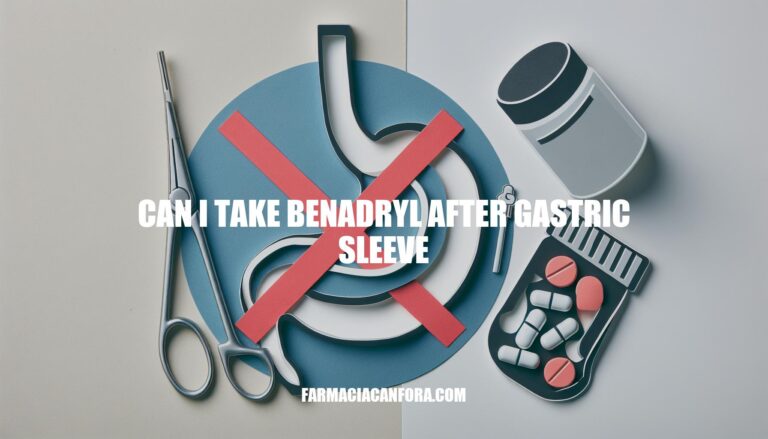


After undergoing gastric sleeve surgery, it’s crucial to understand how medications like Benadryl (diphenhydramine) can affect your body. Post-surgery, your stomach’s size and function change significantly, which can alter how medications are absorbed and tolerated. Knowing which medications are safe to take helps prevent complications and ensures a smoother recovery. Always consult your healthcare provider before taking any new medication after surgery.
Gastric sleeve surgery, or sleeve gastrectomy, involves removing a large portion of the stomach, leaving a tube-like structure. This significantly reduces the stomach’s capacity, limiting food intake and promoting weight loss.
Effects on the digestive system:
Medication interactions:
Always consult your healthcare provider to adjust medications post-surgery.
Benadryl is a brand name for diphenhydramine, an antihistamine. It blocks histamine, a substance in the body that causes allergic symptoms.
It’s important to use Benadryl under medical supervision, especially after surgery, to manage these potential side effects effectively.
Taking Benadryl (diphenhydramine) after gastric sleeve surgery involves several considerations and potential risks:
Absorption Changes: Gastric sleeve surgery reduces stomach size, which can alter how medications are absorbed. This might affect the efficacy of Benadryl.
Drowsiness: Benadryl is known to cause significant drowsiness. After surgery, this can increase the risk of falls or accidents, especially if you’re still recovering.
Gastrointestinal Irritation: Post-surgery, the stomach lining is more sensitive. Benadryl, like other medications, can potentially irritate the stomach lining, leading to discomfort or complications.
Interaction with Other Medications: If you’re on pain medications or other drugs post-surgery, Benadryl can interact with them, enhancing drowsiness or other side effects.
Medical Advice: Always consult your healthcare provider before taking Benadryl after surgery. They can provide personalized advice based on your specific health needs and recovery status.
Healthcare professionals generally recommend caution when using Benadryl (diphenhydramine) after gastric sleeve surgery. Here are the key points:
After undergoing gastric sleeve surgery, it’s crucial to understand how medications like Benadryl (diphenhydramine) can affect your body. The smaller stomach restricts the amount of food you can eat at one time and affects hormones that regulate hunger and blood sugar levels.
Always consult your healthcare provider to adjust medications post-surgery.
Benadryl is a brand name for diphenhydramine, an antihistamine that blocks histamine, causing allergic symptoms. Common uses include:
Use after surgeries includes nausea and vomiting prevention and itching reduction.
It’s essential to use Benadryl under medical supervision, especially after surgery, to manage these potential side effects effectively.
Taking Benadryl after gastric sleeve surgery involves several considerations and potential risks:
Healthcare professionals recommend caution when using Benadryl after gastric sleeve surgery, emphasizing the importance of consulting with a healthcare provider before taking it.
Always consult your healthcare provider before taking Benadryl after surgery to ensure a smoother recovery.